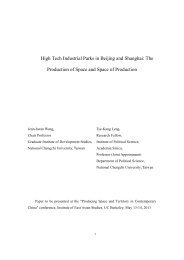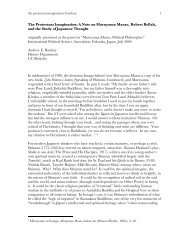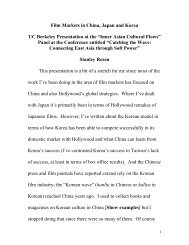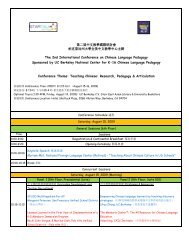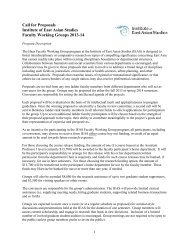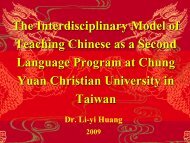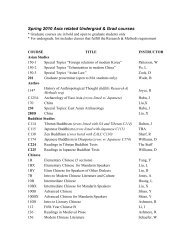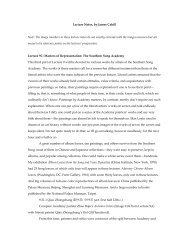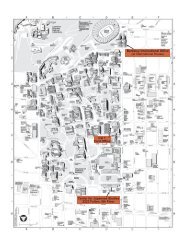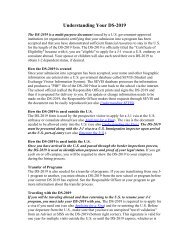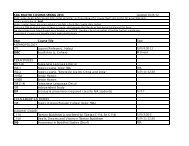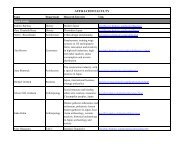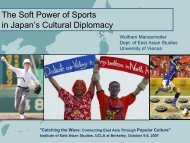Third Edition Spring 2013 - Institute of East Asian Studies, UC ...
Third Edition Spring 2013 - Institute of East Asian Studies, UC ...
Third Edition Spring 2013 - Institute of East Asian Studies, UC ...
You also want an ePaper? Increase the reach of your titles
YUMPU automatically turns print PDFs into web optimized ePapers that Google loves.
lays National Organization (UMNO). In fact, the Communist Party<strong>of</strong> China (CPC) maintains close contact with both the UMNO andthe Malaysian Chinese Association (MCA), the UMNO’s most importantally in domestic political campaigns and the largest Chinesepolitical party in Malaysia. Economically, Malaysian Chinesehave played critical roles in promoting bilateral trade and stimulatinginvestment both into and from China. Especially during theearly days <strong>of</strong> China’s reforms and opening up, Malaysian Chinesebusinessmen were among the first investors from overseas Chinesecommunities who first entered the still largely undevelopedChinese market. For obvious reasons, cultural affinities have to begiven serious consideration in explaining this quick embrace. TraditionalChinese culture has been well preserved in Malaysian Chinesesociety. Chinese language and Chinese education, althoughexperiencing various hardships, have survived decades <strong>of</strong> politicalstruggles. Such cultural linkages have not only played importantroles in maintaining Malaysian Chinese identity, but they also significantlycontributed to the development <strong>of</strong> China-Malaysia relationshipby facilitating channels <strong>of</strong> communication through personaland group connections.Ethnicity is always a central issue in Malaysian domesticpolitics. As early as the colonial era, ethnic tensions emerged dueto imbalances between the political and economic strength <strong>of</strong> differentethnic groups. After the Second World War, the introduction<strong>of</strong> the Emergency Regulation against the insurgency <strong>of</strong> the MalayanCommunist Party (MCP)—a predominantly Chinese leftwing politicalparty—greatly deepened existing racial tension. For a longperiod <strong>of</strong> time, China had openly supported the outlawed MCP infighting the guerrilla war against the Malay-dominated Malayan/Malaysian government. On 13 May 1969, a severe riot broke outin Kuala Lumpur, in which 196 people died because <strong>of</strong> interracialviolence. This incident further exacerbated the conflicts betweenMalays and Chinese. As a result, the Malaysian government adoptedmore stringent affirmative action policies in order to ease racialtension. 3 In 1974, with the establishment <strong>of</strong> diplomatic relations3 “Preparing for a Pogrom”, Time, 18 July 1969. Retrieved 14 May 2007.http://web.archive.org/web/20071116082658/http://www.time.com/time/magazine/article/0,9171,901058-1,00.html(accessed 2/28/<strong>2013</strong>)between the two countries, Beijing severed its connections withthe MCP and China-Malaysia relations were normalized. Due tothis significant shift occurring after 1974, the ways in which ethnicityinfluences China-Malaysia relations will focus only on thepost-1974 era.Ostensibly, much inter-governmental engagement in multilateraldialogues has very little to do with issues related to ethnicity.But I believe the evidence shows that ethnicity does affect Malaysia’sforeign policy towards China. Specifically, in order to protectChinese interests domestically while reducing its dependence onethnic Chinese for dealing with China issues, the Malay-controlledMalaysian government has actively adopted implicitly pro-Chinapolicies, both bilaterally and multilaterally.To elaborate on these points, I will first discuss how ethnicitybecame a central issue in Malaysian society and how the Chinesediaspora fits into the Malaysian domestic political climate ingeneral. In the third section, I will discuss Malaysian perceptions<strong>of</strong> China based on a survey I conducted in 2009. Following this, Iwill underscore the mismatch between Malaysian Chinese’s heavyinvestment in China and their limited roles in domestic politics,which on one hand allows them to economically benefit from closeChina-Malaysia ties, but on the other hand, marginalizes this groupin inter-governmental dialogues. Finally, I will discuss how culturalissues affect China-Malaysia relations by examining the cases <strong>of</strong> thenewly founded Confucius <strong>Institute</strong> at the University <strong>of</strong> Malaya andMalaysia’s government fellowship program for students studyingin China.Ethnicity and Malaysian Domestic PoliticsDirectly influenced by British colonial rule that segregatedpeople along ethnic lines, Malay and its successor state Malaysia,since the colonial era has been described as a plural society parexcellence. Bumiputera is a politically constructed category, whichmeans “indigenous people,” literally a “son <strong>of</strong> soil.” It includes both3 Kankan Xie Ethnicity And China-Malaysia Relations 4



